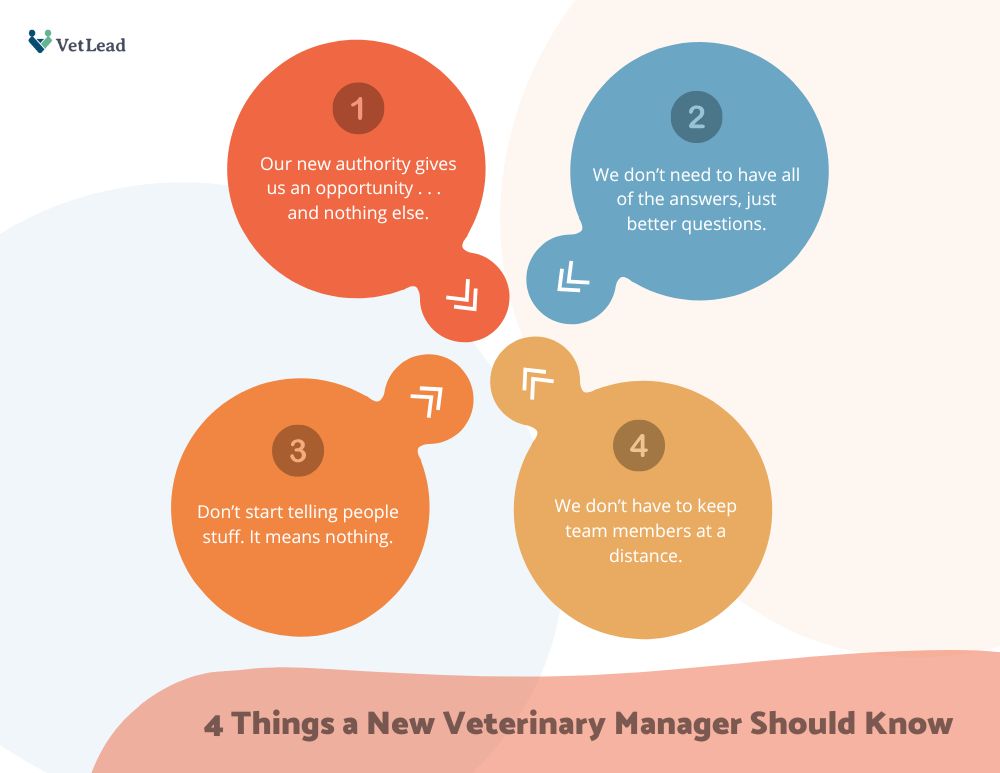Check our the recording of our latest live event, Leading Fast and Effective Change
I often get to work with veterinary managers who are entering into a leadership role for the first time. This is some of the most rewarding work I do. There is no handbook on leadership and many of us struggle tremendously at first.
Leading a practice grants us some authority and all of the sudden we are accountable for not just what we do, but for what others on our team do as well. Here are 4 things that I share with all new leaders.
1
Your new authority gives you an opportunity. . . and nothing else.
Sometimes new supervisors decide that because they are now in charge, they get the respect, loyalty, and commitment of others.
What they really get is a chance to earn those things. People will decide very quickly whether they will trust you and work hard for you.
The alternative of course is your may decide they will tell you what you want to hear and do just enough to get by. You get to determine that outcome by how you work with your team. It’s not guaranteed, or even easy, but you have a shot at it now.
2
You don’t need to have all of the answers, just better questions.
Many new leaders feel like they have to become the source for all ideas and solutions. When they get questions, they feel like their job is to have every answer. Nothing could be further from the truth. In most cases, their job is to build a more capable team that is effective at solving problems.
No team is very successful if they have to run to the boss to get all the answers. It is critical that you ask the right questions to help your team anticipate challenges and opportunities. This will help your team think about issues before they become a crisis.
3
Don’t start telling people stuff. It means nothing.
I hear a lot of practice managers say things like, “I told them to be honest with me”, “I told them that I wanted their ideas,” or “I told them I would listen to anything they had to say.”
People on your team do not care what you tell them. In many cases, because you are now in “management” their first instinct is to not believe what you say anyway. They care about what you show them.
If you want new ideas, candid feedback, or open conversations, you have to create an environment where that is expected and rewarded. What you say now means less. It’s what you do now that means more and affects more people.
4
You don’t have to keep team members at a distance.
Lots of new leaders trip up on this one. They believe that in order to effectively lead people they have to remain aloof and detached. The belief is that they can make better decisions and not be perceived as being friends with anyone on the team.
The truth is, if you are a good leader you will develop a relationship with every person on your team. Furthermore, each relationship will be a little different. You have to learn what drives them, what they care about, and what causes them to fully engage.
You can’t do that at a distance. Yes, it will hurt you if you are perceived to be friends with only one or two of your employees. That’s why you have to build relationships with all of them.

Download this as a PDF for free. No email required.
Wrapping up
Leadership will become much more about judgment and less about your individual performance. Now, your job is to create a fully engaged, highly capable team that produces amazing results.
You are now responsible for the mindset, the accountability, and the growth of these people. This isn’t really about you anymore. When you’re a new leader, that might be the one thing that matters most.
